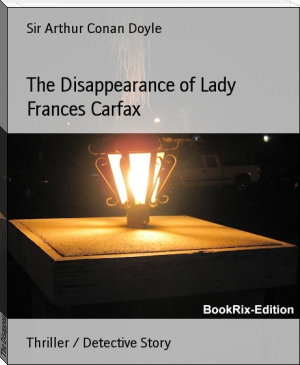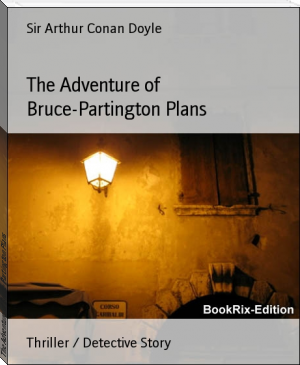His Last Bow - Arthur Conan Doyle (classic books for 12 year olds txt) 📗

- Author: Arthur Conan Doyle
- Performer: -
Book online «His Last Bow - Arthur Conan Doyle (classic books for 12 year olds txt) 📗». Author Arthur Conan Doyle
quantity of blood. Then from the table he took a platter heaped
with small pieces of charred bone.
“Something has been killed and something has been burned. We
raked all these out of the fire. We had a doctor in this
morning. He says that they are not human.”
Holmes smiled and rubbed his hands.
“I must congratulate you, Inspector, on handling so distinctive
and instructive a case. Your powers, if I may say so without
offence, seem superior to your opportunities.”
Inspector Baynes’s small eyes twinkled with pleasure.
“You’re right, Mr. Holmes. We stagnate in the provinces. A case
of this sort gives a man a chance, and I hope that I shall take
it. What do you make of these bones?”
“A lamb, I should say, or a kid.”
“And the white cock?”
“Curious, Mr. Baynes, very curious. I should say almost unique.”
“Yes, sir, there must have been some very strange people with
some very strange ways in this house. One of them is dead. Did
his companions follow him and kill him? If they did we should
have them, for every port is watched. But my own views are
different. Yes, sir, my own views are very different.”
“You have a theory then?”
“And I’ll work it myself, Mr. Holmes. It’s only due to my own
credit to do so. Your name is made, but I have still to make
mine. I should be glad to be able to say afterwards that I had
solved it without your help.”
Holmes laughed good-humoredly.
“Well, well, Inspector,” said he. “Do you follow your path and I
will follow mine. My results are always very much at your
service if you care to apply to me for them. I think that I have
seen all that I wish in this house, and that my time may be more
profitably employed elsewhere. Au revoir and good luck!”
I could tell by numerous subtle signs, which might have been lost
upon anyone but myself, that Holmes was on a hot scent. As
impassive as ever to the casual observer, there were none the
less a subdued eagerness and suggestion of tension in his
brightened eyes and brisker manner which assured me that the game
was afoot. After his habit he said nothing, and after mine I
asked no questions. Sufficient for me to share the sport and
lend my humble help to the capture without distracting that
intent brain with needless interruption. All would come round to
me in due time.
I waited, therefore—but to my ever-deepening disappointment I
waited in vain. Day succeeded day, and my friend took no step
forward. One morning he spent in town, and I learned from a
casual reference that he had visited the British Museum. Save
for this one excursion, he spent his days in long and often
solitary walks, or in chatting with a number of village gossips
whose acquaintance he had cultivated.
“I’m sure, Watson, a week in the country will be invaluable to
you,” he remarked. “It is very pleasant to see the first green
shoots upon the hedges and the catkins on the hazels once again.
With a spud, a tin box, and an elementary book on botany, there
are instructive days to be spent.” He prowled about with this
equipment himself, but it was a poor show of plants which he
would bring back of an evening.
Occasionally in our rambles we came across Inspector Baynes. His
fat, red face wreathed itself in smiles and his small eyes
glittered as he greeted my companion. He said little about the
case, but from that little we gathered that he also was not
dissatisfied at the course of events. I must admit, however,
that I was somewhat surprised when, some five days after the
crime, I opened my morning paper to find in large letters:
THE OXSHOTT MYSTERY
A SOLUTION
ARREST OF SUPPOSED ASSASSIN
Holmes sprang in his chair as if he had been stung when I read
the headlines.
“By Jove!” he cried. “You don’t mean that Baynes has got him?”
“Apparently,” said I as I read the following report:
“Great excitement was caused in Esher and the neighbouring
district when it was learned late last night that an arrest had
been effected in connection with the Oxshott murder. It will be
remembered that Mr. Garcia, of Wisteria Lodge, was found dead on
Oxshott Common, his body showing signs of extreme violence, and
that on the same night his servant and his cook fled, which
appeared to show their participation in the crime. It was
suggested, but never proved, that the deceased gentleman may have
had valuables in the house, and that their abstraction was the
motive of the crime. Every effort was made by Inspector Baynes,
who has the case in hand, to ascertain the hiding place of the
fugitives, and he had good reason to believe that they had not
gone far but were lurking in some retreat which had been already
prepared. It was certain from the first, however, that they
would eventually be detected, as the cook, from the evidence of
one or two tradespeople who have caught a glimpse of him through
the window, was a man of most remarkable appearance—being a huge
and hideous mulatto, with yellowish features of a pronounced
negroid type. This man has been seen since the crime, for he was
detected and pursued by Constable Walters on the same evening,
when he had the audacity to revisit Wisteria Lodge. Inspector
Baynes, considering that such a visit must have some purpose in
view and was likely, therefore, to be repeated, abandoned the
house but left an ambuscade in the shrubbery. The man walked
into the trap and was captured last night after a struggle in
which Constable Downing was badly bitten by the savage. We
understand that when the prison is brought before the magistrates
a remand will be applied for by the police, and that great
developments are hoped from his capture.”
“Really we must see Baynes at once,” cried Holmes, picking up his
hat. “We will just catch him before he starts.” We hurried down
the village street and found, as we had expected, that the
inspector was just leaving his lodgings.
“You’ve seen the paper, Mr. Holmes?” he asked, holding one out to
us.
“Yes, Baynes, I’ve seen it. Pray don’t think it a liberty if I
give you a word of friendly warning.”
“Of warning, Mr. Holmes?”
“I have looked into this case with some care, and I am not
convinced that you are on the right lines. I don’t want you to
commit yourself too far unless you are sure.”
“You’re very kind, Mr. Holmes.”
“I assure you I speak for your good.”
It seemed to me that something like a wink quivered for an
instant over one of Mr. Baynes’s tiny eyes.
“We agreed to work on our own lines, Mr. Holmes. That’s what I
am doing.”
“Oh, very good,” said Holmes. “Don’t blame me.”
“No, sir; I believe you mean well by me. But we all have our own
systems, Mr. Holmes. You have yours, and maybe I have mine.”
“Let us say no more about it.”
“You’re welcome always to my news. This fellow is a perfect
savage, as strong as a cart-horse and as fierce as the devil. He
chewed Downing’s thumb nearly off before they could master him.
He hardly speaks a word of English, and we can get nothing out of
him but grunts.”
“And you think you have evidence that he murdered his late
master?”
“I didn’t say so, Mr. Holmes; I didn’t say so. We all have our
little ways. You try yours and I will try mine. That’s the
agreement.”
Holmes shrugged his shoulders as we walked away together. “I
can’t make the man out. He seems to be riding for a fall. Well,
as he says, we must each try our own way and see what comes of
it. But there’s something in Inspector Baynes which I can’t
quite understand.”
“Just sit down in that chair, Watson,” said Sherlock Holmes when
we had returned to our apartment at the Bull. “I want to put you
in touch with the situation, as I may need your help to-night.
Let me show you the evolution of this case so far as I have been
able to follow it. Simple as it has been in its leading
features, it has none the less presented surprising difficulties
in the way of an arrest. There are gaps in that direction which
we have still to fill.
“We will go back to the note which was handed in to Garcia upon
the evening of his death. We may put aside this idea of Baynes’s
that Garcia’s servants were concerned in the matter. The proof
of this lies in the fact that it was HE who had arranged for the
presence of Scott Eccles, which could only have been done for the
purpose of an alibi. It was Garcia, then, who had an enterprise,
and apparently a criminal enterprise, in hand that night in the
course of which he met his death. I say ‘criminal’ because only
a man with a criminal enterprise desires to establish an alibi.
Who, then, is most likely to have taken his life? Surely the
person against whom the criminal enterprise was directed. So far
it seems to me that we are on safe ground.
“We can now see a reason for the disappearance of Garcia’s
household. They were ALL confederates in the same unknown crime.
If it came off when Garcia returned, any possible suspicion would
be warded off by the Englishman’s evidence, and all would be
well. But the attempt was a dangerous one, and if Garcia did NOT
return by a certain hour it was probable that his own life had
been sacrificed. It had been arranged, therefore, that in such a
case his two subordinates were to make for some prearranged spot
where they could escape investigation and be in a position
afterwards to renew their attempt. That would fully explain the
facts, would it not?”
The whole inexplicable tangle seemed to straighten out before me.
I wondered, as I always did, how it had not been obvious to me
before.
“But why should one servant return?”
“We can imagine that in the confusion of flight something
precious, something which he could not bear to part with, had
been left behind. That would explain his persistence, would it
not?”
“Well, what is the next step?”
“The next step is the note received by Garcia at the dinner. It
indicates a confederate at the other end. Now, where was the
other end? I have already shown you that it could only lie in
some large house, and that the number of large houses is limited.
My first days in this village were devoted to a series of walks
in which in the intervals of my botanical researches I made a
reconnaissance of all the large houses and an examination of the
family history of the occupants. One house, and only one,
riveted my attention. It is the famous old Jacobean grange of
High Gable, one mile on the farther side of Oxshott, and less
than half a mile from the scene of the tragedy. The other
mansions belonged to prosaic and respectable people who live far
aloof from romance. But Mr. Henderson, of High Gable, was by all
accounts a curious man to whom curious adventures might befall.
I concentrated my attention, therefore, upon him and his
household.
“A singular set of people, Watson—the man himself





Comments (0)